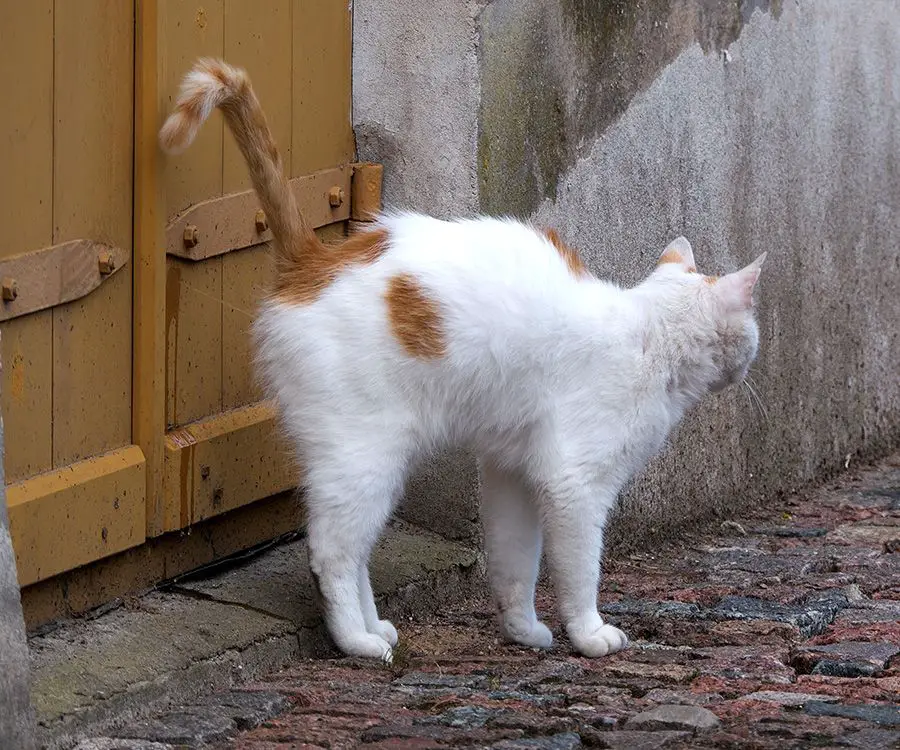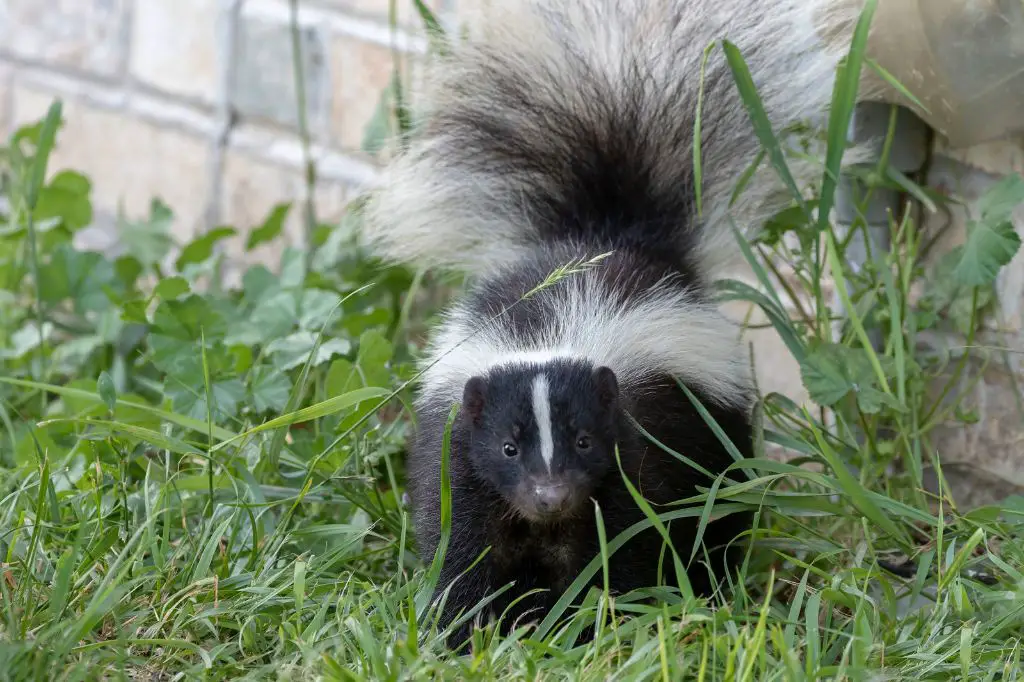What is Cat Spray?
Cat spray, also known as cat marking, is when a cat stands up and urinates on a vertical surface or an object. It’s different from regular urination where a cat squats to pee on a horizontal surface 1. Cat spraying is a territorial behavior and a way for cats to mark their turf, especially intact males and females in heat. Cats often spray because they feel anxious or stressed due to environmental changes, new people, animals, or furniture in the home 2.

Common areas where cats spray include walls, furniture, doorways, windows, and anywhere they can leave their scent mark. The pheromones in cat spray are powerful and can be detected by other cats. While both male and female cats spray, it’s more common in males who haven’t been neutered.
The Smell of Cat Spray
Cat spray has a very strong, pungent odor that is often described as a mix between ammonia, skunk spray, and rotten meat. The smell comes from a mixture of urine and secretions from the cat’s anal glands that contain volatile organic compounds. These compounds give cat spray its very intense smell (Modern Vet, 2022).
The smell is often compared to a skunk’s defensive spray. Both contain sulfur-based thiols that produce a similar foul stench. However, cat spray is higher in ammonia and has a more urine-like quality compared to the muskier odor of skunk spray (Catster, 2022).
Certain factors can affect the odor of cat spray including diet, health issues, and hormonal cycles. Cats eating a diet high in plant proteins tend to have less smelly urine and spray. Medical issues like urinary tract infections or kidney disease can make their urine more pungent. Unneutered male cats may produce more pungent spray when marking their territory (Cats Away, 2022).
Why Cat Spray Smells Bad
Cat spray contains a high concentration of ammonia, which gives it a potent, pungent odor. Ammonia is produced when bacteria in cat urine break down urea, a waste product found in urine (https://www.mcgill.ca/oss/article/you-asked/why-does-cat-urine-smell-so-bad-and-what-can-i-do-about-it).
The strong smell serves an evolutionary purpose for cats. It allows them to mark their territory and send messages to other cats. The ammonia odor is long-lasting, which enables these territorial messages to persist (https://vitaloxide.com/blogs/blog/why-cat-urine-smells-so-bad-and-what-to-do-about-it).
Compared to regular cat urine, spray contains additional proteins and pheromones that make the smell even more potent and distinct. Male cat spray tends to have a stronger odor than females due to hormones. The pungent smell can linger for weeks or months if not properly cleaned.
Removing Cat Spray Odor
Eliminating the smell of cat spray can be challenging, but not impossible. Here are some effective cleaning methods and products for removing cat spray odors:

For fresh stains, start by soaking up excess urine with paper towels. Mix a solution of white vinegar and water (1:1 ratio) and spray it over the area. Let it sit for 5-10 minutes before blotting it up with a clean towel (source). The vinegar helps neutralize odors.
For set-in stains, use an enzymatic cleaner like Nature’s Miracle (source). The enzymes break down the compounds in urine that cause smells. Let the cleaner soak in for 5-10 minutes before blotting.
Baking soda can be sprinkled generously over sprayed areas and left overnight to absorb odors, then vacuumed up the next day (source). It helps deodorize sprayed spots.
Steam cleaning carpets and upholstery can help remove deeply embedded urine smells through heat and moisture. Allow all areas to fully dry after steam cleaning.
To prevent repeat incidents, identify and address the underlying motivation for your cat’s spraying. Provide extra litter boxes, reduce stressors in their environment, and talk to your vet about behavioral or medical issues contributing to spraying.
Understanding Skunk Smell
Skunks are known for their pungent spray, which they use as a defensive mechanism. According to the Wyoming Game and Fish Department, skunks have a gland under their tail that produces an oily, stinky liquid that they can spray when threatened (source).
The main reason skunks spray is to defend themselves from predators. They usually give plenty of warning before spraying by stomping their feet, hissing, and raising their tail. This gives potential predators a chance to retreat before getting sprayed (source).
The chemical makeup of skunk spray is what makes it so pungent and hard to remove. According to the Iowa Department of Natural Resources, the main smelly compounds in skunk spray are thiols and thioacetates, both of which contain sulfur (source). These sulfur-rich compounds are similar to the ones that give rotten eggs their unpleasant odor.
Another reason skunk spray smells so bad and lingers is that it is an oil-based liquid. This allows the thiols and thioacetates to stick strongly to surfaces and permeate materials. The oily nature of the spray makes it very difficult to fully eliminate the odor.
Comparing Cat Spray and Skunk Odors
While both cat spray and skunk spray have notoriously pungent odors, there are some key differences in the chemical compounds that produce these smells.

Cat spray contains a mixture of urine, pheromones, and other bodily secretions that create an ammonia-like odor. The main chemical compounds are felinine, an amino acid, and thiols, sulfur-containing organic compounds (Modern Vet). Thiols are partly responsible for that unpleasantly sharp, acrid smell.
Skunk spray, on the other hand, contains thiols like 3-methyl-1-butanethiol as the primary stinky compound. It also has a sulfur-like odor from other thiols and thioacetates (Cats Away). These create an extremely pungent, skunky smell.
While both can be quite intense, skunk spray is often considered more aggressively smelly. The thiols in skunk spray tend to have a more penetrating odor that can linger in an area for weeks or even months (FVEAP). Cat spray smells are also long-lasting, but may dissipate more quickly by comparison.
Subjectively, cat spray is often described as smelling like strong urine with ammonia notes. Skunk tends to smell more noxiously “skunky” with a characteristic rotten odor. Both are unpleasant, but skunk spray takes the intensity to another level.
Cat Spray vs. Skunk Spray Solutions
When it comes to neutralizing the potent smell of cat spray or skunk spray, there are some effective commercial products and home remedies to try:
For cat spray, products like Nature’s Miracle Just for Cats and Angry Orange Pet Odor Eliminator can help remove urine odors. Baking soda, vinegar, hydrogen peroxide, and lemon juice are effective home remedies. Thoroughly clean any sprayed areas and allow them to fully dry.
Skunk odors require stronger solutions. Nature’s Miracle Skunk Odor Remover and Smelleze Skunk Smell Remover are specifically designed to neutralize skunk spray. A hydrogen peroxide, baking soda, and dish soap mixture can also help lift skunk oils. Avoid using vinegar, as this can set the smell.
Preventing spray incidents is ideal. Keep cats indoors or supervised outside, cover trash cans securely, install motion sensor lights, and take steps to exclude skunks from getting under porches and sheds. Knowing effective solutions for removing cat spray and skunk odors can make cleanup easier if it does occur.
When to Seek Professional Help
In some cases, relying solely on DIY solutions may not be enough to tackle a cat or skunk spraying problem. Here are some situations where you may need to call in professional help:

- Severe or persistent cat spray smells that do not go away, even after trying every DIY remedy. The smell may have saturated deep into porous materials like wood or drywall and require more advanced cleaning methods.
- Large skunk spray cleanup jobs, like if a skunk has sprayed along an exterior wall. The powerful smell can be challenging to remove yourself.
- Health concerns arise due to the smell, like headaches, breathing issues or nausea. Professionals have commercial-grade equipment to thoroughly eliminate odors.
Companies like Rainbow Restoration specialize in eliminating stubborn cat and wildlife smells using techniques like odor encapsulation and thermal fogging. They can provide a deep clean to rid your home of unpleasant odors.
Don’t continue living with overwhelming cat or skunk odors. Contact the experts for an effective solution if DIY options don’t do the trick.
Caring for Cats Who Spray
If your cat has started spraying around your home, there are several things you can do to try to resolve the behavior. First, it’s important to rule out any medical causes by taking your cat to the veterinarian. Issues like urinary tract infections or other sources of pain can cause cats to start spraying.
For cats with no medical issues causing the behavior, behavior modification training may help. This involves identifying triggers that cause your cat to spray and then working to reduce their anxiety and stress around those triggers. Providing adequate outlets for play and exercise can also help regulate stress levels. Pheromone diffusers like Feliway can provide calming effects as well.
Finally, providing appropriate litter boxes is key. Make sure boxes are clean, located in quiet areas, and provide one box per cat plus an extra. You may need to experiment with different litter types, box styles, or box locations to find what your cat prefers. With patience and a variety of approaches, spraying issues can often be resolved.
Living Alongside Skunks
Skunks are common wildlife that live in many suburban and urban areas. While their spray can be unpleasant, there are some simple tips for peacefully coexisting with them.
The most effective skunk deterrent is removing any food sources, water, or shelter that may attract them to your property. Make sure trash bins are sealed and no pet food is left outside. Close off any potential denning spots like porches or under sheds. Installing motion-activated lights and sprinklers can also help deter skunks (source).
If a skunk does spray, don’t panic. The smell is terrible but harmless. Thoroughly wash your body and clothes with hydrogen peroxide, baking soda and soap. Avoid harsh chemicals that could harm wildlife. Call animal control if a skunk seems sick or is regularly on your property (source).
Overall, be aware of skunk behaviors and avoid startling them. Never attempt to trap or harm skunks, as this is illegal in many areas. With some simple precautions, skunks can be harmless neighbors (source).
